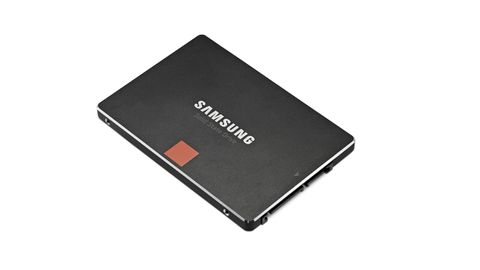TechRadar Verdict
Pros
- +
Good performance
- +
TLC flash memory
- +
New controller and firmware
Cons
- -
Slight drop off in performance over time
Why you can trust TechRadar
Yes, we know what you're thinking. Well over £200 for a 256GB SSD? Aren't SSD prices supposed to be going down, not up? Generally speaking, the answer would be a clear affirmative. But there's always space for something a little special at the top of the price lists.
The question Samsung's asking, therefore, is just how much are you willing to pay for the ultimate in SSD oomph.
Perhaps the toughest comparison for the 840 Pro is Samsung's own 830, which can be had in equal 256GB capacity for about £60 less. The new drive is going to need some pretty nifty moves to justify that price differential.
Technologically speaking, there's a triple whammy of critical enablers that might just make that possible: new flash memory, new firmware and a new controller chipset.
The new memory is Samsung 21nm Toggle NAND complete with a 400Mbps interface. Meanwhile, the controller is Samsung's fourth-generation effort, known as MDX. The chip's spec include three ARM Cortex R4 cores running at around 300MHz and the same controller you'll find in the much cheaper 840 non-pro.
For context, the old 830 series drive had a triple-core controller based on ARM cores and running at 220MHz and Toggle 1.0 NAND rated at 133Mbps. So the big difference in terms of performance you can likely trace to the flash memory in each drive.
As for the firmware, we don't have any new data to divulge. But we can confirm that the foreground garbage collection feature from the 830's MCX controller remains, which bodes well for long-term reliability.
On a related note, the 840 Pro comes with a standard five-year warranty, while the plain 840 makes do with three-year cover. Rounding out the hardware is 512MB of 1,066MHz DDR2 DRAM cache memory. By default, spare memory area is set to around seven per cent of capacity, though that's adjustable using Samsung SSD Magician tool.
Losing the magic
If that's the 840 Pro on paper, what's it like driving data round your desktop? Pretty darn good, on the whole.
There is a proviso attached to this drive though, and not of its own making. Our test sample had been round the block once before and Samsung didn't make its SSD Magician software tool available to help us do a factory reset. That explains why a few of the performance numbers are a tad disappointing.
We know, for instance, that it will do over 70MB/s in the AS SSD 4K random write test in box-fresh condition. The 59MB/s that it achieves in our benchmarks is still good - but it's just not as spectacular as it might have been.
Of course, box freshness is not a terribly realistic state. To reflect that, we also gave each drive an endurance test. For quite a few drives, the result was a pretty significant performance drop off. For the 840 Pro, what damage there was had already been done.
The only slight snag was that OCZ's Vertex 4 also ran the endurance test and managed to maintain its over 70MB/s speed. In objective terms, then, the new 840 Pro isn't quite the quickest drive you can buy.
Technology and cars. Increasingly the twain shall meet. Which is handy, because Jeremy (Twitter) is addicted to both. Long-time tech journalist, former editor of iCar magazine and incumbent car guru for T3 magazine, Jeremy reckons in-car technology is about to go thermonuclear. No, not exploding cars. That would be silly. And dangerous. But rather an explosive period of unprecedented innovation. Enjoy the ride.

